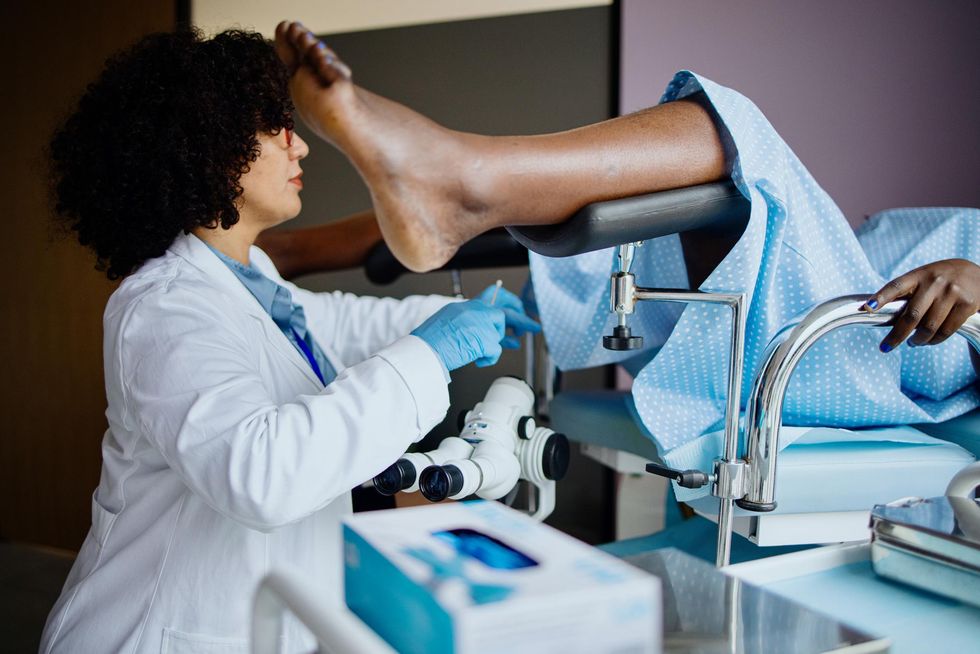
I was today years old when I learned the 'why' behind getting a pap smear. I always used to look at it as one of my annuals that I booked an appointment for, propped up my legs, braced for the discomfort of the speculum, and just did. I knew it was for my health but for some reason, it never clicked for me that a pap smear had everything to do with being preventative and was mostly about your cervix. Even as a 31-year-old who had a LEEP procedure done to remove precancerous cells nearly a decade ago, the dots never totally connected for me that ‘pap smear’ is to the cervix and cervical cancer as ‘mammogram’ is to breasts and breast cancer. Don’t come for me, but I was simply doing what I was ‘supposed’ to do without thinking of the bigger picture as it relates to my health and preventative measures like annual pap smears.
Coming to terms with that realization is actually what led me to write this piece. I realized that there was probably someone like me who was simply rolling with the punches of booking yearly doctor exams, or even someone who might not even go because they may believe going to a gynecologist is only for people who have “an issue” down there. I’m here to demystify some of the myths around pap smears. In honor of it being Cervical Cancer Awareness Month, I am here to also do my part in empowering women to advocate for their health needs, especially when it comes to a form of cancer with a 92% survival rate when diagnosed in its earliest stages. And do you know the easiest way to detect cervical cancer before it becomes cancerous? If you said ‘pap smear,’ you are right on the money.
I spoke with Dr. Janelle Howell, DPT, WCS, also known as the Vagina Rehab Doctor to help spill the deets on what you need to know about pap smears and cervical health.
What is a pap smear?
Perhaps it's elementary, my dear Watson, but I wanted to cover all of my bases when breaking down pap smears for this piece. A pap smear, or a pap test, is short for the Papanicolaou test. It is a diagnostic procedure that tests for cervical cancer in women. A doctor takes a small instrument to brush sample cells on the cervix and then sends those samples to a lab for the results. Once the samples have been tested, a patient can either get a normal test result (which literally means everything is all good under the hood) or an abnormal result (which could signify abnormal changes found on the cervix).
Depending on your doctor, they might suggest doing a colposcopy or a biopsy to ensure that the abnormal test result is not due to the presence of precancerous cells. If it is due to precancerous cells, the next step might be scheduling a procedure like a LEEP to remove those cells from the cervix. Your gynecologist will know best in regards to formulating a treatment plan that works best for you.

Anchiy/Getty Images
How often should you be getting a pap smear?
The answer to this question may differ depending on your medical history, but Dr. Howell shares that "generally speaking, about every three years is a good frequency to get one." She also adds that every five years, it is recommended to get an HPV test for the human papillomavirus, which is what leads to cervical cancer.
While Dr. Howell suggests people visit their gynos yearly, pap smear or no pap smear, she says that ultimately your specific gynecologist will be able to tell you how often you should visit and what the plan should be if you do have an abnormal pap test result.
When should we visit the gynecologist and what should we expect?
Although there are some people who prioritize regular checkups, there are others who do not have the privilege of accessible healthcare. There are also folks who might not resort to visits with healthcare professionals unless there is a problem or an issue. Such is the case sometimes with gynecologists. As previously mentioned, Dr. Howell advises women to visit their gynecologist yearly even if they don't have a pap smear or a symptomatic health issue or concern. During those routine wellness checks with your gynos, you are able to get things done like a pelvic exam where they exam the vulva as well as the internal reproductive organs, which includes the cervix. Dr. Howell adds that during these exams, gynecologists usually "do an internal exam, apply manual pressure along the abdomen to see if you have tenderness along the uterine border, and order any other needed tests or measures, like a pelvic ultrasound."
She also shares that even if they don't go through the uncomfortable steps of giving you a pap smear, they will look at the cervix and the vaginal canal. "Think about it like getting an oil change. You gotta pop in there every now and then, especially if you are sexually active. You want to make sure you are staying on top of your pelvic health, your reproductive health, and all of that because we are getting our periods monthly, we are in our reproductive ages, and we still have our uterus that needs to be checked on."
"If we are having a lot of clotting, if we are having a lot of pain with our periods, or having missing periods or irregular periods -- those are things that we want to be updating our gynecologist on, so they can make sure nothing more serious is going on causing those symptoms," Dr. Howell concludes.
At what age should you start getting pap smears?
The most common age to start getting pap smears is 21, but typically when a patient is sexually active, they are advised to start getting pap smears then. Of note, just because you aren't sexually active doesn't mean you shouldn't be getting regular pap smears, especially if you are over the age of 21.
This brings us to our next question and answer...
Should you get a pap smear even if you're not sexually active?
Sometimes, we look at doctor's visits from a lens of reactivity versus proactivity. Such is the case with gyno appointments. Sexual activity and/or vaginal health issues are not a prerequisite for gynecologist visits. But Dr. Howell encourages everyone to see the importance of getting pap smears, and even HPV tests, even if you aren't sexually active. "HPV can be transferred, not just from internal sources [like the penis and vagina] but you can get HPV just from skin-to-skin contact."
She states this to emphasize the point that sex is not the only way to get HPV, which is ultimately what leads to cervical cancer. "You can literally just have someone’s skin who has HPV contact your skin, then you are at risk of getting it. There are HPV cells that live on the vulva, that live on the penis, that live on the groin. There’s also oral HPV," she continues, "You don’t have to have sex to get it. So be aware of that."
HPV can even be transferred from mother to child through the vaginal tract, so children can get it from their mothers if their mothers have it. The bottom line is, just because you aren't sexually active doesn't mean you shouldn't be getting pap smears and regularly testing for HPV.

PeopleImages/Getty Images
How can you advocate for your cervical health in relationships and gyno visits?
If you are sexually active, the number one thing you can do to better support your cervical health is to use protection. Dr. Howell notes that using condoms during sex is "one of the most basic, affordable, and safe ways" to guard the cervix. By practicing safe sex "we are limiting the amount of exposure to bodily fluids and bacteria on someone’s genital skin that can impact our cervix. Exposure to someone’s bodily fluid or [the] skin of someone who has HPV is a common way to become infected. We generally get it from another person."
In instances where women want to feel empowered to go beyond the routine pap smear, Dr. Howell wants you to advocate for your cervical health by doing your research and talking to your doctor openly in order to feel confident and comfortable with your cervical health status.
What are some holistic ways to support your cervical health?
Supporting your cervical health can go beyond regular doctor visits, getting pap smears, and using protection during sex. It also looks like having strong sexual health boundaries overall, as well as making better lifestyle choices. "If our diet is filled with more inflammatory foods than anti-inflammatory foods, then that is not going to necessarily help the cervix. So like processed foods, those things are more inflammatory than fresh foods."
For that reason, Dr. Howell suggests doing things like adding "color to your diet." She goes on to say, "You want to make sure that you are getting more color in your diet from plants, which help us to fight inflammation and fight disease. That’s the whole purpose of food, to nourish our bodies." Speaking of diet, another key to nourishing your cervical health is by decreasing your sugar intake. "When I am saying sugar, I am talking about artificial sugar like the sugar that we are putting in our coffee, or the sugar that is in juice; it’s concentrated into one small cup. Artificial sugar and high amounts of it, have been associated with just more inflammation in the body, which includes the cervix."
In addition to watching the amount of sugar you consume, she suggests observing your vitamin A and vitamin D levels as they are "protective for the cervix." "We are eating every day anyway, so you might as well eat foods that help your body to thrive." And for a beta-carotene-rich food that is accessible as it is nutritious, Dr. Howell looks to carrots and says one carrot a day is enough to assist with vitamin A levels which are necessary for cervical health.
As a Pelvic Floor Physical Therapist, Dr. Howell knows the importance of considering the pelvic floor as a way to support the cervix. "Your pelvic floor includes all the muscles that support your cervix and supports your uterus to prevent prolapse. So, checking in on your pelvic floor for pelvic floor symptoms, like urinary leakage, a bulge in the vagina, a 'heaviness' in your vagina, or constipation -- these are things you want to consider in terms of your pelvic floor. Seeing a pelvic floor physical therapist is crucial to helping you overcome those symptoms and take care of your pelvic floor muscles, which are by far the most important muscle group for supporting the position of your cervix and uterus."
For more of Dr. Howell, follow her on Instagram @vaginarehabdoctor.
Let’s make things inbox official! Sign up for the xoNecole newsletter for daily love, wellness, career, and exclusive content delivered straight to your inbox.
Featured image by Natalia Gdovskaia/Getty Images
This Is How To Keep 'Holiday Season Stress' From Infecting Your Relationship
Hmph. Maybe it’s just me, but it seems like there is something really weird happening in the fall season air (because winter doesn’t officially begin until December 21) that cuddle season is in full swing while break-up season is as well. In fact, did you know that break-ups are so popular during the holiday season that December 11 is deemed Break-Up Day?
The reasons why relationships shift around this time vary; however, I did both roll my eyes and chuckle when I read that a very popular one is because it’s an easy way to get out of getting one’s significant other a Christmas present. SMDH.
Anyway, I personally think that the less shallow folks out here may contemplate calling things “quits” or they at least distance themselves a bit from their partner (and what I’m referring to is serious relationships) due to all of the stress and strain that oftentimes comes with the holidays whether it be financial, familial, due to their tight schedules or something else.
Listen, I would hate for you and your man to miss the fun and happiness of experiencing this time of year, all because you are so overwhelmed or irritated that you can’t really enjoy it. That’s why I have a few practical tips for how to avoid allowing the typical holiday season stress from INFECTING your relationship.
Manage Your Expectations
 Giphy
GiphyUnmanaged expectations. If there is a main reason why the holiday season tends to be so stress-filled for so many people, I’d bet good money that this is the cause. And when you’re in a long-term relationship, expectations can manifest themselves in all sorts of cryptic and/or unexpected ways. You might have relatives who assume that you are going to be with them for Thanksgiving or Christmas when you have other plans in mind. You might be thinking that you are going to spend one amount for presents while your man is thinking something totally different. When it comes to scheduling, your signals may be crossed.
And you know what? To all of these scenarios, this is where clear and consistent communication come in. Don’t assume anything. Don’t dictate anything either. From now until New Year’s, mutually decide to check in once a week, just to make sure that you are both on the same page as it relates to the holidays and what you both are thinking will come along with it. The less blindsided you both feel, the less stressed out you will be. Trust me on this.
Set (and Keep) a Budget
 Giphy
GiphyOkay, so I read that last year, 36 percent of Americans incurred some type of holiday-related debt. Hmph. Last year, there was still some sense of normalcy in this country, chile, so I can only imagine what finances are gonna look like over the next several weeks. That said, since I don’t know a lot of people who don’t find being broke stressful, make sure that you and your bae set a budget and then stick to it this year — no ifs, ands or buts.
Because really, y’all — it doesn’t make sense to deplete savings and/or max out credit cards for a few days of giggles only to be damn near losing your mind because you don’t know how to make ends meet come Dr. Martin Luther King, Jr. Day.
And by the way, this tip doesn’t just speak to things like food and gifts; I also mean travel. If it doesn’t make a ton of sense (or cents) to be all over the place this year — DON’T BE.
Keep Matthew 5:37 at the Forefront
 Giphy
GiphyIf off the top of your head, you don’t know what Matthew 5:37 says, no worries, here ya go: “But let your ‘Yes’ be ‘Yes,’ and your ‘No,’ ‘No.’ For whatever is more than these is from the evil one.” That verse right there? Oh, it’s a boundaries lifesaver! I say that because do you see “maybe” or “I’ll think about it” in there? Nope. LOL. It says that you should tell people “yes” or “no” and leave it at that — and that complements Anne Lamott’s quote, “’No’ is a complete sentence” impeccably well. Yeah, you’ve got to remember that anything beyond a yes or no to a request is privileged information; you don’t owe anyone details or an explanation.
Besides, if you are really honest with yourself, when someone asks you something and you give a “Umm, let me think about it” kind of reply, more times than not, you already know what your answer is going to be — so why not let you both off of the hook? Give your response. Commit to that. And let everyone (including yourself) get on with their lives and schedules.
I promise you that when it comes to those holiday parties, you are pissing more folks off by not RSVP’ing or doing so and not showing up than just saying, “Thank you but not this year” off the rip.
Remember That Your Personal Space Is Privilege Not a Right
 Giphy
GiphyA friend of mine recently bought a new house and invited me over to come see it. He’s a single man with no children, so as I was taking in all of the space that he had, especially as I walked through his finished basement, I joked about relatives coming to live with him. “Hell no” and “absolutely not” were pretty much his immediate responses as he went on to say that some folks even had the nerve to be offended when he told them that he had no intentions on taking DNA in.
Ain’t it wild how people think that your stuff is their right? And yes, that brings me to my next point. Your home is your sanctuary space. If you want to host folks this year — cool. If not, ALSO COOL. Please don’t let folks (family included) guilt you into how they want you to act or even into what they would do if the shoe was on the other foot. You are not them — and as one of my favorite quotes states, “If two people were exactly alike, one of them would be unnecessary.” (A man by the name Larry Dixon said that.)
Hell, my friends? They know that I am good for sending them random things that they need or even want all throughout the year. Coming over to hang out at my pace, though. Uh-uh. Chalk it up to being a card-carrying member of the ambivert club yet I like keeping my living space personal — and I sleep like a baby, each and every night, for feeling that way.
Always remember that your space, your time, your resources, your energy and shoot, yourself period (including your relationship), are all things that are your own. You get to choose how, when and why you want to share them. The holiday season is certainly no exception.
Cultivate Some “You Two Only” Traditions
 Giphy
GiphyIt’s not uncommon for some couples to hit me up after the holiday season to “detox.” Sometimes it’s due to the financial drama (and sometimes trauma) that they experienced. Sometimes it’s because they allowed their relatives (especially in-laws) to get more into their personal business than they should’ve. More than anything, though, it tends to be because they didn’t get enough quality time together and so ended up feeling “disconnected.”
Please don’t let that happen. Listen, I’m not even a holidays kind of woman and yet, I will absolutely sit myself down with some hot chocolate and chocolate chip cookies to enjoy a Hallmark holiday film or two. Aside from the fact that most of them are lighthearted and sweet, I also like that they usually focus on couples loving on each other amidst all of the holiday beauty and ambiance — which is something that all couples should set aside some time to do.
Maybe it’s a vacation. Maybe it’s a staycation. Or maybe it’s my personal favorite, A SEXCATION. Whether it’s for a few days, the weekend or even overnight — don’t you let the holidays go by without setting aside time for you and your man to celebrate one another. Don’t you dare (check out “Are You Ready To Have Some Very Merry 'Christmas Sex'?”).
GET. SOME. REST.
 Giphy
GiphyI once read that 8 out of 10 people get stressed out over the holidays and 3 out of 10 lose sleep during to it — and when you’re stress-filled and sleep-deprived, that can absolutely lead to hypersensitivity, making mountains out of molehills and even not being in the mood for sex.
Your relationship can’t afford to go through any of this, so definitely make sure to prioritize rest. I don’t care how unrealistic it might seem during this time, sleep should never be seen as a luxury; it will always and forever be a great necessity.
That said, try to get no less than six hours of shut-eye in (check out “6 Fascinating Ways Sex And Sleep Definitely Go Hand In Hand”) and even ask your bae to take a nap with you sometimes (check out “Wanna Have Some Next-Level Sex? Take A Nap, Sis.”). Not only will sleep help to restore your mind, body and spirit but, when it’s with your partner, it’s an act of intimacy that can make you both feel super connected, even in the midst of what might feel like chaos.
___
Holiday season stress is real. Still, never give it the permission or power to throw your relationship off. Put you and your man first and let the holidays be what they are gonna be, chile.
Let’s make things inbox official! Sign up for the xoNecole newsletter for love, wellness, career, and exclusive content delivered straight to your inbox.
Featured image by Shutterstock
How To Avoid Being An Emotionally Impulsive Spender This Holiday Season
Geeze. Can you believe that we are just a few days out from another Christmas? Yeah, me neither. In fact, because I’m not a holidays person myself (check out “So, What If You Don't Observe Holidays?”), it wasn’t until one of my clients was venting about how stressed out she was due to all of the holiday season procrastinating that she had been doing that I realized just how fast December is actually flying by.
If, like her, you’re feeling frazzled because, although you told yourself last year that you weren’t going to wait until the last minute to “handle your business,” you ended up doing exactly that, fret not. I’ve got 10 tips that can keep you from making emotionally-triggered decisions as far as your financial expenses are concerned. Merry Christmas. #wink
1. Create a Budget. Stick to It.
 Giphy
GiphyBudgets, boy. I recently read that one of the reasons why they don’t work for a lot of people is because many folks don’t have a clue about how much money they spend on a monthly basis to begin with. SMDH. That said, at the end of the day, it’s important to remember that a budget is simply setting boundaries/limits on your spending — and being intentional about moving in this fashion is always a wise move; especially when it comes to this time of the year…especially being that it’s typical for half of all Americans to take on some type of holiday season debt with 17 percent needing six (or more) months to pay it off.
Know what can prevent this kind of financial chaos? A SPENDING BUDGET. Tips for how to create one of your own this year can be found here.
2. Never Shop When You’re Stressed or Pressed
 Giphy
GiphyYou know how they say that it’s not a good idea to go grocery shopping when you’re hungry? Although the holiday season can be a stressful time, avoid shopping for gifts (or décor or food for recipes) when you are feeling stressed out or pressed for time. More times than not, that cultivates anxiety which could cause you to either purchase things that you don’t really want or to spend money that you don’t really have (P.S. If you’re relying on credit cards, that qualifies as money that you don’t really have. Just sayin’).
3. Don’t Keep Up with the Joneses
 Giphy
GiphyKnow something else that can stress you out: trying to keep up with the Joneses. And y’all, now that we have social media, the reality is that envy is at an all-time high. That’s because it can be really easy to watch holiday engagements, holiday trips and folks bragging about the things that they’ve received in times past, only for you to find yourself wishing that you were them — or putting pressure on yourself and those in your world to keep up.
Listen, it is King Solomon who once said, “So are the ways of everyone who is greedy for gain; It takes away the life of its owners” (Proverbs 1:19 — NKJV) and “A sound heart is life to the body, but envy is rottenness to the bones” (Proverbs 14:30 — NKJV) and he’s considered to be the wisest man who ever lived (during his time — I Kings 4:30). Yeah, both of these verses are a spiritual reminder that whatever you are planning to do or give, do it out of the goodness of your heart — not so that you can low-key “outdo” the next guy.
4. No Need to “Tit-for-Tat”
 Giphy
GiphyThis one might be a bit controversial yet I’m totally okay with that. I don’t care what the occasion is, no one is OWED a present. A gift is a voluntary token of one’s appreciation or affection. That said, if you decide to give someone a present this year, don’t automatically expect something in return. If you get something, cool. If not, if you were giving for the right reasons, it really shouldn’t matter (RIGHT?). On the flip side, if someone decides to get you something and you don’t have something to offer in return, also cool.
Other than going to someone’s home for a holiday dinner or party, for anyone to feel like they should have something in hand because someone else does…that’s not giving, that’s competing — and that absolutely should not be the spirit that you are in (or around) during this time of year.
Again, a gift is not an obligatory thing. If you’ve always thought otherwise, it’s time to do some serious reprogramming.
5. Avoid the Pressure to Buy for Lots of Adults
 Giphy
GiphyLast month, Newsweek published an article that said it’s wise to not spend a ton of money purchasing gifts for adults. A financial expert in the piece said that it’s best to buy for kids because, more times than not, you’re going to get adults something that they already have a lot of, they don’t really need or they’re not going to use (beyond maybe regifting) anyway.
If you’re not feeling that insight, my take would be to exchange names and set a price cap for the grown folks. I say that because, I don’t think that people ever outgrow wanting something over Christmas. It’s just that the over-the-top energy should be reserved for the kiddies — and even then, the “4-gift rule” (want, need, read, experience) is probably your best bet for them…financially and otherwise.
6. Go for Thoughtful over Expensive
 Giphy
GiphyIt’s kind of wild how much close-to-torture folks send themselves through to purchase gifts that, a good 6-8 months now, most folks aren’t even going to remember. That’s why it’s also a good idea to purpose in your mind to get something thoughtful over expensive.
Honestly, that’s a big part of the reason why Etsy continues to be a go-to for gifts (for every occasion) for me. It’s because you can oftentimes get things customized/personalized which ends up meaning so much more to people than something that you bought at a generic department store that might have a high price tag yet still lacks in sentimentality and deep meaning.
7. Use Coupons and Promo Codes
 Giphy
GiphyCoupons (and promo codes) are a slippery slope in the sense that…they remind me of when I used to go overboard while thrift store shopping. I say that because, just because I might find several bomb dresses for under $20, what am I going to do with 50 of ‘em (over time)? It’s just as much of a waste of money as buying couture if neither option gets much use.
And that’s kind of the thing about coupons and promo codes. Some people end up overspending because they rationalize that so long as there are discounts attached, it’s all good. At the same time, this doesn’t mean that you should forego coupons and promo codes altogether. The key is to put together your shopping list (and budget) and then use discounts specifically for those items. If you do this, you could save well over $1,000 annually (at least, depending on what you decide to buy).
8. Avoid Add-Ons
 Giphy
GiphyYeah. Dodge add-on expenses. Add-ons like what? The first thing that comes to my mind is a warranty. What’s the chance that someone is actually going to need that? Another example is paying for things to be “professionally” gift wrapped. Chile, throw that stuff in a gift bag with some tissue paper and go on about your day. All good.
9. Rethink Gift Cards
 Giphy
GiphyIf there is any time of the year when there is a noticeable hike in gift card purchases, now would be it. And although they are a convenient approach to gift giving, at the same time, many come with hidden fees, the full amount oftentimes goes unused (which ends up being a waste of money) and they do come with expiration dates that are oftentimes forgotten.
So, if you’re someone who likes to wait until the last minute to do your holiday shopping, resist the urge to impulsively pick up a handful of gift cards. Unless it’s to a place that you know someone is going to use within the next few months, they could end up in somebody’s kitchen drawer for the next couple of years. And what a waste that would be.
10. They’ll Get It When They Do. And That’s Okay.

=
GiphyOne more. Although it is super thoughtful and proactive to get people their gifts in time for whatever occasion you purchased them for, if trying to reach that goal is going to require paying for rush shipping that is damn near as high as the price of gift or spending a lot of gas money that you don’t have at the moment to drive miles and miles away — take the pressure off to spend a ton of cash just to make sure that something arrives at December 25. Listen, through doing business with Etsy, I have learned that through this administration, there are all sorts of tariff issues going on and the USPS is slower than ever too, so paying more may not guarantee much.
The hack? Send a message that something special is coming…soon enough. The thought really is what counts (more times than not); plus, it builds anticipation of something good coming, even if it’s after all of the Christmas Day hoopla. And no one (with sense) is going to have a problem with that.
Now don’t you feel better? Happy Holiday Shopping, sis.
Let’s make things inbox official! Sign up for the xoNecole newsletter for love, wellness, career, and exclusive content delivered straight to your inbox.
Featured image by Shutterstock







